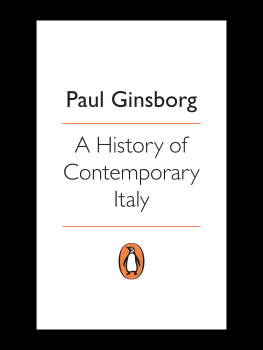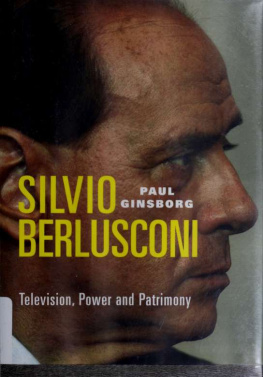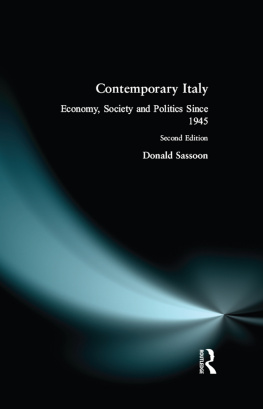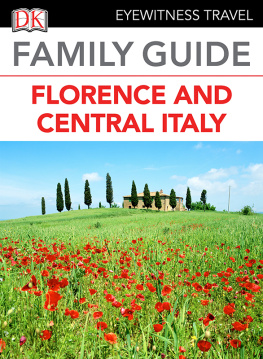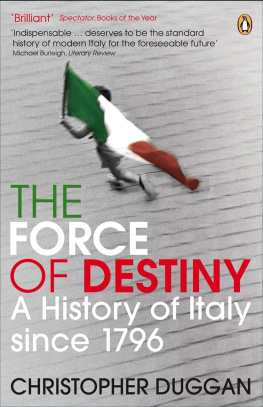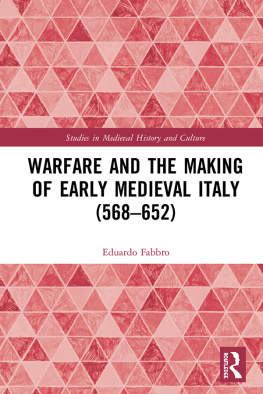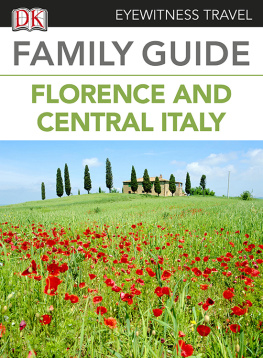PENGUIN BOOKS
A HISTORY OF CONTEMPORARY ITALY
Paul Ginsborg was born in London in 1945. He graduated in history from Queens' College, Cambridge, in 1966 and was a Research Fellow there from 1968 until 1971. For the next six years he was Lecturer in History at York University. From 1977 to 1980 he lived in Italy and taught at the University of Turin. In 1980 he returned to England to take up a Lectureship in Politics at Cambridge University and a Fellowship at Churchill College. In 1991 he was appointed Reader in European Politics at Cambridge. His present post is Professor of Contemporary European History in the Faculty of Letters and Philosophy, University of Florence. His previous publications include Daniele Manin and the Venetian Revolution of 18481849, which also appeared in Italian.
From the reviews of the Italian edition, published by Einaudi:
A history of contemporary Italy that one reads as if it was a novel. It combines the pathos of a traveller's memoirs with the rigorous documentation and popularizing skills of the Anglo-Saxon school Anna Maria Guadagni in L'Unit
From now on, Ginsborg's work will form the basis for every serious discussion of the period Gian Giacomo Migone in L'Indice
Controlling with enormous skill an endless number of sources, Ginsborg offers us a deeply convincing vision of Italy A book of considerable documentary value, and as fascinating as a novel Agazio Loiero in Il Messaggero

A History of Contemporary
Italy

SOCIETY AND POLITICS 19431988

PAUL GINSBORG

PENGUIN BOOKS
For Vittorio
PENGUIN BOOKS
Published by the Penguin Group
Penguin Books Ltd, 80 Strand, London WC2R 0RL, England
Penguin Putnam Inc., 375 Hudson Street, New York, New York 10014, USA
Penguin Books Australia Ltd, 250 Camberwell Road, Camberwell, Victoria 3124, Australia
Penguin Books Canada Ltd, 10 Alcorn Avenue, Toronto, Ontario, Canada M4V 3B2
Penguin Books India (P) Ltd, 11 Community Centre, Panchsheel Park, New Delhi 110 017, India
Penguin Books (NZ) Ltd, Cnr Rosedale and Airborne Roads, Albany, Auckland, New Zealand
Penguin Books (South Africa) (Pty) Ltd, 24 Sturdee Avenue, Rosebank 2196, South Africa
Penguin Books Ltd, Registered Offices: 80 Strand, London WC2R 0RL, England
www.penguin.com
First published 1990
Copyright Paul Ginsborg, 1990
All rights reserved
The moral right of the author has been asserted
Except in the United States of America, this book is sold subject to the condition that it shall not, by way of trade or otherwise, be lent, re-sold, hired out, or otherwise circulated without the publisher's prior consent in any form of binding or cover other than that in which it is published and without a similar condition including this condition being imposed on the subsequent purchaser
ISBN: 978-0-14-193167-8

Contents

Chapter 1
Italy at War
Chapter 2
Resistance and Liberation
Chapter 3
The Post-war Settlement, 19458
Chapter 4
The Agrarian Reform
Chapter 5
Christian Democracy in State and Society
Chapter 6
Left-wing Politics and the Working-class Movement in the 1950s
Chapter 7
The Economic Miracle, Rural Exodus and Social Transformation, 195863
Chapter 8
The Centre-left, 195868
Chapter 9
The Era of Collective Action, 196873
Chapter 10
Crisis, Compromise and the Anni di Piombo, 197380
Chapter 11
Italy in the 1980s

Preface

I TALY IN 1943 was little changed, outside of its major cities, since the time of Garibaldi and Cavour. It was still predominantly a peasant country, of great and unspoiled natural beauty, of sleepy provincial cities, of enduring poverty, especially in the South, of rural culture and local dialects. It was also a country in terrible crisis. Mussolini's desire for imperial expansion had led to the invasion of Italy both from the north, by the Germans, and from the south, by the Allies. The very integrity of the nation state, which was less than eighty years old, was called into question. As one British officer in Italy commented at the end of 1943: Collectively, they [the Italians] are to us a beaten people who live in squalor and have made a mess of their country, their administration and their lives.
Forty-five years later, Italy has been transformed out of all recognition. It has become one of the most economically powerful nations of the world, with a Gross Domestic Product more or less equal to that of Britain. It has undergone an extraordinary process of enrichment, urbanization and secularization. The peasant cultures of the previous centuries have not disappeared altogether, but they have been replaced overwhelmingly by a single national urban culture. There has been an unprecedented migration of country dwellers to the cities, and of southern Italians to the North. During the years of the Republic, Italy has witnessed the most profound social revolution in the whole of its history. This great transformation is the principal protagonist of this book.
Italy has been transformed, but the continuities in its history are not easily set aside. While charting the country's dramatic passage to modernity,I have tried to keep in mind certain themes and issues which have been constants in Italian history at least since the Risorgimento: the incapacity of the lites to establish their hegemony over the classes that lay below them; the weakness and inefficiency of the state; the strength of the Catholic church in Italian society; the class consciousness of significant sections of Italian urban and rural workers; the special political role of the ceti medi, the middle classes of Italian society; the enduring problem of the South.
There is one other theme upon which I have tried to concentrate in particular. It is that of the relationship between family and society. Attachment to the family has probably been a more constant and less evanescent element in Italian popular consciousness than any other. Yet the question of how this devotion to family has shaped Italian history, or been shaped by it, has rarely been posed.
The few scholars who have ventured on to this terrain have been disparaging in the extreme about the social role of the Italian family. They have placed the emphasis firmly on Italian familism, i.e. the accentuation of exclusive family values and actions. In the late 1950s the American sociologist Edward Banfield achieved notoriety with his denunciation of the amoral familism of the peasants he had studied at Chiaramonte in the Basilicata. For Banfield the extreme backwardness of Chiaramonte was due to the inability of the villagers to act together for their common good, or indeed, for any good transcending the immediate, material interest of the nuclear family.
Next page
